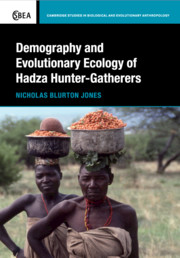Book contents
- Frontmatter
- Contents
- Preface and acknowledgments
- Part I Demography
- Part II Applying the demographic data to interpreting Hadza behavior and biology
- 12 Introduction
- 13 The outcome variables: fertility, child survival, and reproductive success
- 14 Men's and women's reputations as hunters, traders, arrow makers, and diggers
- 15 Marriage
- 16 Another dependent variable: growth as a proxy for fitness
- 17 Inter-birth intervals: a trade-off between fertility and offspring survival?
- 18 Grandmothers as helpers
- 19 Grandmothers and competition between the generations
- 20 Children as helpers
- 21 Husbands and fathers as helpers
- 22 Variation among hunter-gatherers: evolutionary economics of monogamy, male competition, and the sharing ethic
- References
- Index
19 - Grandmothers and competition between the generations
from Part II - Applying the demographic data to interpreting Hadza behavior and biology
Published online by Cambridge University Press: 05 January 2016
- Frontmatter
- Contents
- Preface and acknowledgments
- Part I Demography
- Part II Applying the demographic data to interpreting Hadza behavior and biology
- 12 Introduction
- 13 The outcome variables: fertility, child survival, and reproductive success
- 14 Men's and women's reputations as hunters, traders, arrow makers, and diggers
- 15 Marriage
- 16 Another dependent variable: growth as a proxy for fitness
- 17 Inter-birth intervals: a trade-off between fertility and offspring survival?
- 18 Grandmothers as helpers
- 19 Grandmothers and competition between the generations
- 20 Children as helpers
- 21 Husbands and fathers as helpers
- 22 Variation among hunter-gatherers: evolutionary economics of monogamy, male competition, and the sharing ethic
- References
- Index
Summary
In this chapter, I report data on Hadza grandmothers and reproductive competition. In SI, I report Hadza data relevant to the paper by Fox et al. (2009), which is based on the pattern of inheritance of the X-chromosome (SI 19.1). I also discuss in SI the distinction between theories of “stopping early” and “living longer,” models of the evolution of grandmothering, and offer simulations of evolution away from the current life history. The main business of this chapter arises from two important papers by Rufus Johnstone and Michael Cant on competition between women of different generations.
Following the descriptions of humans as cooperative breeders, Cant and Johnstone (2008) suggested that we look at a key feature of mammalian cooperative breeders, competition between generations, as a selection pressure for menopause. The core of Cant and Johnstone's argument is that if older women can acquire resources that are useful to younger kin, there must be competition over their allocation. In our papers (Hawkes et al., 1997, 1998) and in Chapter 18, we suggested that Hadza grandmothers have their effect by providing food. Because food eaten by one child or grandchild is not available to be eaten by another, if the grandmother is still reproducing she should have less surplus food to give to grandchildren. The grandmother's effect on grandchild growth and survival should decrease as it is divided among more children and grandchildren. Despite the day-to-day collegiality of Hadza women, there is inevitable competition for the grandmother's food. Who would win the competition for her surplus, the grandmother or the younger generation?
In groups of cooperatively breeding mammals, such as the meerkat, mole rat, and some canids, there are a few females, or even only one, who breed and others who do not breed but remain in the group and contribute to the reproductive success (RS) of the breeders. Usually the breeders are older and the suppressed breeders are younger, and most are close kin. Cant and Johnstone proposed that in the human case, the older generation was suppressed. The key issue is the allocation of resources between the young kin and the older woman's continued childbearing and child-rearing. The outcome of the competition will depend on the fitness gains to each generation. Cant and Johnstone attend to allocation between the grandmother's own reproduction and that of her daughters and daughters-in-law.
- Type
- Chapter
- Information
- Demography and Evolutionary Ecology of Hadza Hunter-Gatherers , pp. 383 - 400Publisher: Cambridge University PressPrint publication year: 2016



